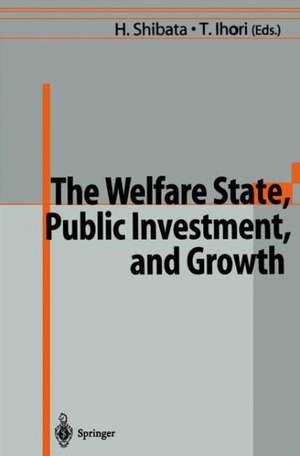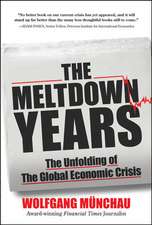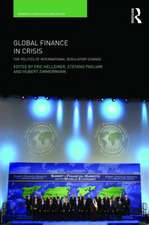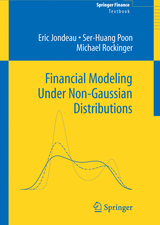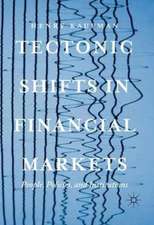The Welfare State, Public Investment, and Growth: Selected Papers from the 53rd Congress of the International Institute of Public Finance
Editat de Hirofumi Shibata, Toshihiro Ihorien Limba Engleză Paperback – 29 oct 2012
Preț: 391.40 lei
Nou
Puncte Express: 587
Preț estimativ în valută:
74.90€ • 81.33$ • 62.92£
74.90€ • 81.33$ • 62.92£
Carte tipărită la comandă
Livrare economică 22 aprilie-06 mai
Preluare comenzi: 021 569.72.76
Specificații
ISBN-13: 9784431680147
ISBN-10: 4431680144
Pagini: 352
Ilustrații: XIII, 334 p.
Dimensiuni: 155 x 235 x 22 mm
Greutate: 0.49 kg
Ediția:Softcover reprint of the original 1st ed. 1998
Editura: Springer
Colecția Springer
Locul publicării:Tokyo, Japan
ISBN-10: 4431680144
Pagini: 352
Ilustrații: XIII, 334 p.
Dimensiuni: 155 x 235 x 22 mm
Greutate: 0.49 kg
Ediția:Softcover reprint of the original 1st ed. 1998
Editura: Springer
Colecția Springer
Locul publicării:Tokyo, Japan
Public țintă
ResearchDescriere
This book presents fifteen papers selected from the papers read at the 53rd Congress of the International Institute of Public Finance held at Kyoto, Japan, in August 1997. Although organized under the general title of Public Finance and Public Investment, the Congress covered a wide range of topics in Public Finance. One of the highlights of the Congress was a historic and brilliant debate between two of the greatest living authorities in the area of public finance, Professors James M. Buchanan and Richard A. Musgrave, on the nature of the welfare state and its future. Part I of this book is concerned with this debate and its empirical counterpart. James M. Buchanan (Chapter 1) warns that the welfare state will be unsustainable unless it preserves generality or at least quasi generality in welfare programs. The introduction of overt discrimination in welfare programs through means testing and targeting can only diminish public support. He argues that a political version of the "tragedy of commons" will emerge if and when identifiable interest groups recognize the prospects of particularized gains as promised by discriminatory tax or transfer payments. Faced with mounting pressure from entitlement-like claims of special interest groups against public revenues on one hand and equally strong pressure against further tax burdens on the other, political leaders are attracted to solutions that single out the most vulnerable targets. Distributional disagreement among classes will then become a major source of political discourse and an impetus for class conflict.
Cuprins
I. The Welfare State.- Chapter1 The Fiscal Crises in Welfare Democracies with Some Implications for Public Investment.- Chapter2 Comments on James M. Buchanan’s Paper.- Chapter3 Social Security and Economic Growth—Implications for East Asia.- II. Public Investment and Economic Growth.- Chapter4 Corruption, Public Investment, and Growth.- Chapter5 Modeling Government Investment and Economic Growth—A Review and Some New Evidence.- Chapter6 Tax Evasion as a Disciplinary Mechanism for Fiscal Policy.- III. Inter-Governmental Relations.- Chapter7 Public Investment Issues and Efficient Climate Change Policy.- Chapter8 Decentralized Government and Macroeconomic Control.- Chapter9 Foreign Direct Investment—Rules versus Discretion.- IV. Tax Competition and Foreign Direct Investment.- Chapter10 Foreign Direct Investment and Tax Competition in Southeast Asia.- Chapter11 Investment Distinctions—The Effect of Taxes on Foreign Direct Investment in the U.S..- V. Foreign Investment in Transitional Economies.- Chapter12 Investment Crisis in Post-Soviet Russia.- Chapter13 The Infrastructure Development and Foreign Direct Investment in China.- VI. Intergovernmental Transfer Systems.- Chapter14 An Equalization Transfer System in Japan.- Chapter15 Fiscal Federalism in Australia.
Caracteristici
This book is based on the proceedings for the 53rd Congress of the International Institute of Public Finance held at Kyoto, Japan in 1997 and covers a wide range of topics in Public Finance *
One of the high lights in this book is a historic debate between two of the greatest living authorities in the area of public finance,
Professors James M. Buchanan and Richard A. Musgrave
One of the high lights in this book is a historic debate between two of the greatest living authorities in the area of public finance,
Professors James M. Buchanan and Richard A. Musgrave
